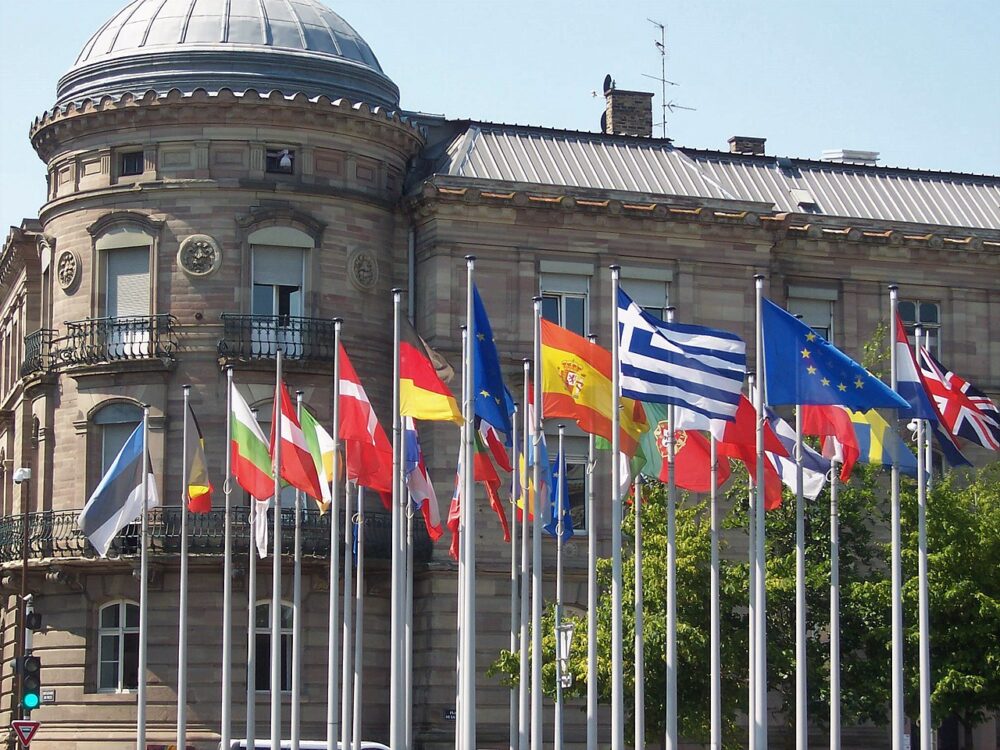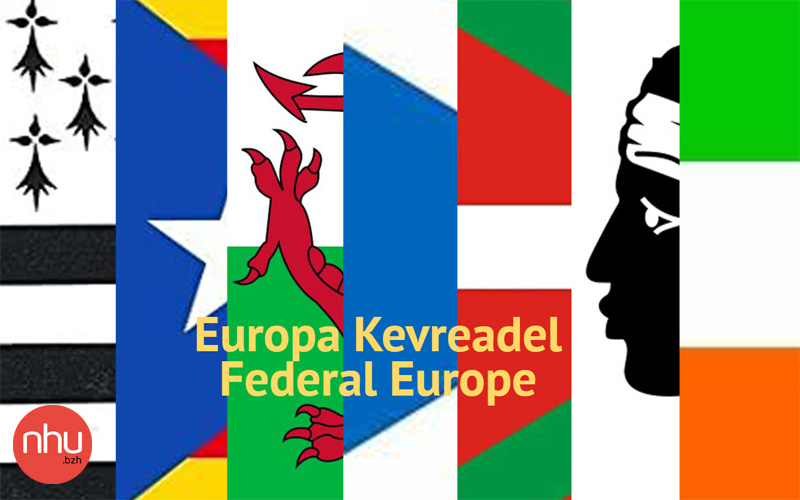A federal Europe of nations II: Beware – there are two Europes

Mathieu Guihard President of the Breton Party / Strollad Breizh
First of all, we need to ask ourselves: what do we mean by a federal Europe? The French public is largely ignorant of the term, which has been virtually banished from the Parisian media-political world.
Federalism has been a dirty word in France since the Terror (*)… Yet French European federalists do exist: they can be found among the Macronists, the Greens and the French Socialist Party. French sovereigntists (LFI, RN, Reconquête, PCF, LR, etc.) castigate them. This is the only dividing line we’ve been served up for 40 years.
During the 2024 European election campaign, Bernard Guetta, the outgoing Renew (Macronist) MEP, published a book with the evocative and provocative title “The European Nation”.
Bernard Guetta calls himself a European federalist, and opposes French sovereignists as much as Russian and American imperialism.
In the course of his dispensable and rather narcissistic account of his European peregrinations to convince often dubious Lithuanians, Swedes, Poles and Romanians, the idea of a federal Europe takes shape. But is it really federal?
Federal Europe, really ?
Bernard Guetta’s diagnosis of the current dysfunctions of a sclerotic European Union is accurate.
In 60 years, we’ve built the European Union, step by step. But we’re still in the middle of the road.
Our institutions are hybrid and incomprehensible. We haven’t had the courage to see European integration through to the end, and we’ve ended up with a technocratic “thing” that’s as slow as a mammoth, guided in reality by the member states who are its real mahouts.
All major decisions are taken by the governments of the member states, a fact never mentioned in France. Even the fine principles of Europe cannot stand up to the rule of the nation-states.
Just look at the European Union’s total lack of reaction when Madrid seriously violated the human rights and fundamental freedoms of European texts during the self-determination referendum prevented by Madrid in Catalonia in 2017.
The member states validated it, and the European institutions said nothing.
Revealing. But Bernard Guetta doesn’t mention this in his book, preferring to evoke distant peoples in struggle, or Polish conservatives… A true Raphaël Glucksmann (**).
There is a nation and a nation-State.
So yes, Bernard Guetta criticizes the crushing weight of the member states, wants the European Parliament to have more power and deplores the Council’s power over it.
And so he wants to erect the “European nation”. Except that Europe is not a nation, and Europeans are not a people, and that’s his mistake. A very French mistake.

A state is only viable and healthy if it is the fruit of a nation. In reality, Guetta wants to erect the nation-state of Europe. He is reproducing the mortifying historical process of France, a predatory state that preceded a French nation still pathologically searching for its national identity 1,000 years later.
The Europe of the pro-European French bears a striking resemblance… to a France seeking a new empire, colonizing its own continent.
A Jacobin Europe that would engender revolutions at home and wars abroad, doomed to self-destruction to the misfortune of its inhabitants. We know all this.
European federalism or French Jacobinism?
Bernard Guetta is just another French Jacobin. What’s more, he spares no effort in “selling” France to his European interlocutors.
With Trump’s American disengagement from Europe from 2017 to 2021, he triumphs and presents France as the “defender of Europe” (p22).
Except that when Europe is attacked in 2022, when it comes to taking action, it’s France that sends the least military equipment to the Ukrainians, and that talks the longest with Vladimir Putin, no matter how long the table…
What kind of Europe is this? A Europe submissive to the dream of domination of the French nation-state, all too happy to regain its former lustre by substituting soft American domination with French imperialism straight out of the 19th century.
Let’s face it, the countries of Central Europe have clearly understood the French game against a people’s Europe, which, as always in history, will result in imperialist France coming to terms with the imperialists. But we won’t do it to them (***).
A French obsession
And yet Bernard Guetta struggles on like a cock sure of his indispensability.
He laments that his European partners do not share his love of French-style planning (p.61). He sees himself as an avant-garde elite showing the way to the peoples of Europe (p. 84).
Yet it is revealing that he contrasts federalism and nationalism (p.111), even though the two are perfectly compatible within the European framework.
What’s more, he dismisses nations and regions alike as useless junk (p. 102).
He’s adamant about bringing the Ukraine into the EU, while farmers in Brittany and France are surely equally useless old fashions, to be sacrificed “in the name of democracy and freedom”.
In short, Guetta is a banal French statist who wants to apply French imperialism on a European scale, building a blue-white-and-red Europe, Europe the Jacobin way.
His “European nation” is in reality the nation-state Europe, and in this he is like all French European “federalists”.
Back in the 2000s, didn’t Dominique Strauss-Kahn call for the erection of a Europe “from the Sahara to the North Pole”? Dreams of grandeur, always… A deadly mania born of the French Revolution, which ends in totalitarian disaster.
No, thank you!
At the end of the day, nothing differentiates French European “federalists” from French sovereignists.
Here’s how nostalgic Eric Zemmour spoke on RTL on September 10, 2018: “The French genius is to remake the Roman Empire. That is, to unite all the European populations, once unified under the Roman Empire, and take them under its wing. France is the new Roman Empire!”
“What’s the difference? They’re two sides of the same coin, French imperialism masquerading as humanism. Yann Fouéré, in his classic “Europe of the 100 flags”, had already identified them back in 1968, castigating in turn “the Europe of nation-states advocated by De Gaulle, (and) the single Europe of citizens dreamed of by the extremists of ‘nation-Europe’”. (p.38)
A truly federal Europe !
In this essential work, Yann Fouéré associates the European nation-state with hyper-taxation, control of information, control of the masses… implemented by businessmen and senior civil servants (p.64).
Sound familiar? Yann Fouéré’s lucid and relentlessly modern commentary is a must-read. He predicts that if Europe’s nation-states persist, they will lead to European dictatorship and World War III, after having led to the first two. Premonitory?
But then, are we condemned to banish all utopia, all dreams of a prosperous and harmonious European future?
The great Breton politician Aristide Briand, winner of the 1926 Nobel Peace Prize, wanted to build a United States of Europe, and Breton activists of the 1930s like Morvan Marchal defended the idea of European federalism. Utopians, to be sure.
For the time was ripe for empires and their universalism, which led to ever more destructive wars.
Today, in a world where the human condition is at the heart of globalisation and technology, the idea of a truly federal Europe has never been more relevant or necessary.
This is the Europe of 100 nations, the Europe of the peoples of the great European family.
The third and final article in a series calling for a federal Europe of nations from Mathieu Guihard will appear soon. Read part one, A federal Europe of nations: Is a new world emerging that will engulf Europe? here
(*) “The Terror” is a period of the French Revolution beginning in 1793 which has shaped the French political life since then.
(**) This Socialist European MEP from Paris is known for regularly denouncing human rights violations around the world.
(***) Bernard Guetta is “wounded by such accusations” (p.42). Yet he is also aware of France’s unflattering image in the eyes of its European partners: “It was France that was the most dangerous in their eyes,” he laments on p. 47. He comes back to this several times, and fails to understand the “false trial” that his partners are making of France, suspected of “double-dealing” with Putin (pp.117 and 131).
Support our Nation today
For the price of a cup of coffee a month you can help us create an independent, not-for-profit, national news service for the people of Wales, by the people of Wales.






Many years ago I was a member of a roup of British business people seeking to do business with the European Commission.. To be a member of the Group we all had to have a reasonable knowledge of at least one of the official languages of the European EEC, other than English. It became known that a French national European commissioner reneged on his agreement to address the group because not all the members spoke French. Hid reasoning “If they cannot speak French they are not fit to be European”. I might add that he himself spoke excellent English.